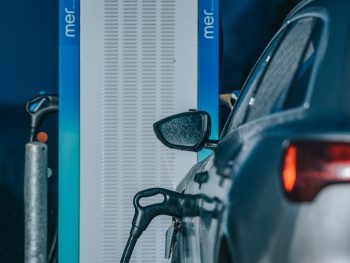Norway’s Mer launches into UK’s EV charging market
EV charging specialist Mer, part of Norwegian energy giant Statkraft, is launching into the UK market to help solve the EV infrastructure gap – including in workplaces.

Mer will focus on what it says are underserved – but high footfall – areas of the UK, such as business car parks
In the run-up to the 2030 ban on the sale of petrol and diesel cars and vans, Mer will focus on what it says are underserved – but high footfall – areas of the UK, such as business car parks, key retail locations and into areas managed by local authorities where there will be high usage – for example, residential streets where people don’t have driveways or garages. The company brings with it the experience of running similar programmes in Norway.
Mer – previously known as Gronn Kontakt UK – adds that its drive to put more chargers into workplaces is crucial as Benefit-in-Kind incentives and salary sacrifice schemes are supporting a shift among fleets to electric.
Not everyone is in the position to install a personal charging point at their home and, by offering workplace charging, employers gain an added incentive for recruitment or retention as well as demonstrating their commitment to sustainability.
And there is a need to support charging requirements as commercial vehicles start to shift to zero-emissions.
Mer, which sources all its energy from 100% renewable and traceable sources, is already working with blue-chip firms, delivery fleets and recently forged a partnership with one of the UK’s biggest motoring associations to offer customer support 24/7.
It also works with organisations such as local councils to enable on-street charging in underserved areas. It’s part of the Scaling On-Street Charging Infrastructure Project (SOSCI) in the North of England – where the aim is to put on-street chargers within five minutes’ walk of communities where off-street parking isn’t an option.
Commenting on the work needed in the UK, UK managing director Anthony Hinde said: “The Government has set ambitious targets for the switch to zero-emission vehicles, especially with the announcement of the 2030 ban on sales of new petrol and diesel cars.
“This target is absolutely achievable, but it will require a fundamental shift in how the UK’s EV charging infrastructure is developed. Home and on-the-road chargers remain fundamental aspects of the UK’s EV charging network, but if we just focus on that, we won’t succeed.
“The lessons we have learned from Norway – where the majority of new car sales are now electric – is that installing EV chargers into workplaces and more broadly into community locations, and switching fleet vehicles to electric, will be a critical element to the success of the green vehicle transition.”


